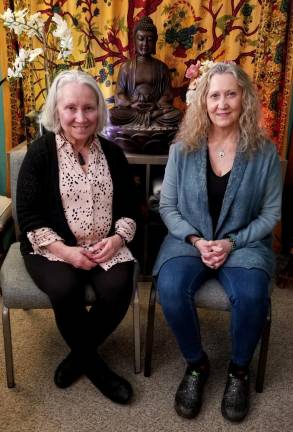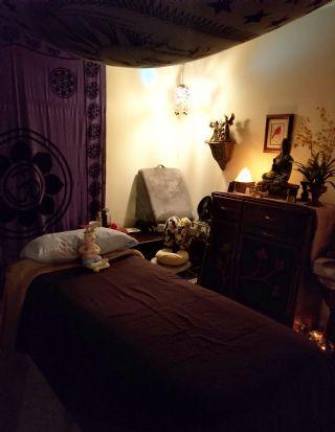Healing addiction naturally
Alternative health center digs into the roots of dependence


“The term ‘functional family’ is elusive,” said Debra Hollinrake, a partner at The Tree of Health Center in Newton, NJ. How easy it is to become traumatized as a child, she explains, when we are so sensitive to our surroundings, living with a small and vulnerable survival unit. Even bullying can be a root issue that damages your self-esteem and leads down the line to addiction issues.
Retired nurse Linda Mitchell founded The Tree of Health Center in 2012, teaming up with Hollinrake, an entrepreneur and natural medicine advocate, to tackle the issues underlying problems like addiction. The center is based around the idea that alternative medicine has the potential not only to resolve those deep-seated traumas, but can also help patients find a deeper sense of self along the way. There is a caveat to addiction recovery though: one must be ready and open to change.
Their unique approach focuses first on massage therapy, to dismantle discomfort in the nervous system, and then encourages patients to utilize techniques – like craniosacral therapy, Reiki or hypnosis – to tap into their emotional struggles. Massage therapy can serve as a way to break through the armor, helping clients access their emotions surrounding trauma and start to process them through therapeutic discussion.
This dual tactic helps to develop healthy responses to triggers, providing new tools — other than substance abuse or unhealthy habits — to cope with emotional distress. Addiction, as Hollinrake defines it, is using something to fill the lack of nourishment elsewhere in someone’s life. It becomes a safety net, to avoid facing emotional distress and trauma.
One particular modality, Be Set Free Fast, has proved an especially successful and simple way to heal distress that can lead to addiction, said Hollinrake. In this technique, developed in the 90s by clinical psychologist Larry Nims, patients adopt a cue word that helps to rearrange subconscious thoughts so they can better align with thoughts of the conscious mind. This non-invasive modality can be an especially helpful for patients who don’t wish to revisit traumatic experiences. Nims, now legally blind, co-hosted a meditative session, freely accessible online, to deal with the emotional fallout related to the pandemic.
The craniosacral therapy sessions that Mitchell normally offers at the center utilize gentle touch to palpate the joints of the cranium, alleviating tension in the nervous system. It’s likely that those suffering from emotional trauma inadvertently impact their nervous system as well, she explains, which can lead to digestive, immunity, circulation and other physical issues. Now she is offering hour-long distance CST sessions over the phone, as well as online meditation classes and distance Emotional Freedom Technique sessions, in which patients carefully revisit emotional distress and then utilize acupressure. Based on ancient philosophy of chi, thought to be the life force that flows through the body, EFT involves tapping meridian points of the body that can release energy blockages caused by negative emotions.
Mitchell was initially resistant to taking her hands-on therapy remote. She emphasizes our basic human need for connection and touch, which, she explains, has been disturbed for a surprising number of people from a young age. “Our center is known for our hugs when clients enter our oasis of warmth,” she said. “Our clients look forward to this social and physical interaction with our healthcare team as part of their own healing.”
“Isolation can compromise anyone’s spirit,” said Mitchell. “We need social and physical interaction to stay well and happy.” She points to a new review of studies in The Lancet, which found a long list of psychological impacts of quarantine including symptoms of posttraumatic stress disorder, insomnia, depression, irritability and anger. Those impacts got worse the longer the quarantine’s duration, and some researchers suspect the effects may be long-lasting.
Everyone is going to have to muddle through this period, doing “their best to find the door in which they will feel safe to heal,” she said. “During times when isolation becomes necessary, people will have various degrees of coping or not.”
Connecting online helps, and Mitchell reported in mid-April that her early distance healing sessions had been surprisingly promising. "It really has shifted my whole energy around how powerful we are, you know," she said. "When we put that intention and connect with someone who’s in another town or another state, we have the power to really be able to synchronize." Each session she's done remotely, "I feel their energy," she said, maybe as a heat in her hands, or an urge to start crying.
Still, these will be particularly trying times for people struggling with addiction, said Mitchell – which, to be real, is most of us. “We live in an addictive world,” she said, “from drugs, alcohol, shopping, sex, eating and technology as well. Who isn’t addicted to something?”